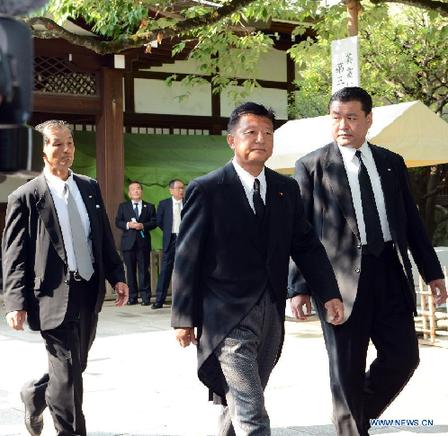Japanese ministers, lawmakers visit shrine
 0 Comment(s)
0 Comment(s) Print
Print E-mail China.org.cn, August 15, 2013
E-mail China.org.cn, August 15, 2013
Two Japanese ministers on Thursday morning visited the notorious Yasukuni shrine, a move that will further undermine the ties with its neighboring countries.
|
Japanese Internal Affairs Minister Yoshitaka Shindo (C) arrives at the war-linked controversial Yasukuni Shrine for worship, in Tokyo, on Aug. 15, 2013. Visits to the shrine by Japanese ministers and lawmakers have sparked strong opposition from China and South Korea, both of which had suffered from Japan's aggression. (Xinhua/Ma Ping) |
The visit was made by Japanese Internal Affairs and Communications Minister Yoshitaka Shindo and Keiji Furuya, state minister in charge of North Korea's past abductions of Japanese citizens.
They came to the shrine successively during 8:00 to 9:00 am, and left after 15 minutes' visit.
Shindo told reporters that his visit to the shrine is a personal one which will not affect Japan's diplomatic ties with other countries.
Shinjirou Koizumi, son of former prime minister Junichiro Koizumi, also visited Yasukuni Shrine.
Following two cabinet members, about 90 Japanese lawmakers also paid visit to the war-linked Yasukuni Shrine on the same day, the 68th anniversary of Japan's surrender in the World War II. Sanae Takaichi, policy chief of the ruling Liberal Democratic Party (LDP), and Takeo Hiranuma, deputy head of the Japan Restoration Party, were among the 90 lawmakers.
"People in countries in the world mourn the loss of those who died for their countries and pay respect," said the LDP policy chief.
The Yasukuni Shrine honors 2.5 million Japanese war dead, including 14 Class-A war criminals in the World War II, and is considered as a symbol of Japan's past militarism.
Prime Minister Shinzo Abe, who was represented by his aide Koichi Hagiuda, made an offering to the shrine as the head of the LDP.
Haguida said Abe regretted that he is "unable to make a visit" on the day. Abe's decision to skip the visit was out of the concern that he said may spark opposition from China and South Korea.
China has expressed a strong protest and condemnation regarding the visits. China's Vice Foreign Minister Liu Zhenmin summoned Japanese Ambassador to China Masato Kitera and lodged solemn representation over the issue, according to a spokesman from the ministry.
Repeated visits to the controversial shrine by Japanese leaders and lawmakers have become a major obstacle for Japan to mend ties with its neighbors, especially China and South Korea, which suffered from Japan's invasion during World War II.
There is irrefutable evidence that Japanese militarism was responsible for crimes of aggression during World War II. Only by looking squarely at and reflecting on its history can Japan develop a real sense of friendly and cooperative relations with Asian neighbors.
Japanese Prime Minister Shinzo Abe said on Wednesday that he would not visit the war-linked shrine but he would not prevent his cabinet members from visiting the shrine.
Chinese Foreign Ministry spokesman Hong Lei Wednesday urged the Japanese side "to abide by its commitment to recognize and reflect on its aggression history, and speak and act cautiously on related issues, so to win trust from victim countries and their people as well as the international community."







Go to Forum >>0 Comment(s)